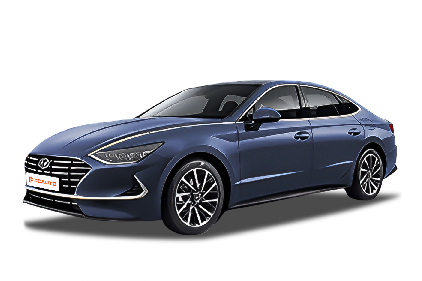Q
What is the factory warranty on a 2020 Hyundai Sonata?
The 2020 Hyundai Sonata typically comes with a factory warranty of 5 years or 100,000 kilometers (whichever comes first), covering manufacturing defects and material flaws. The powertrain may even have extended coverage—though it's always best to check with your local dealer for the latest terms.
Honestly, Hyundai’s warranty is one of the more competitive in the industry, especially compared to Japanese rivals. The longer coverage shows the brand’s confidence in its build quality and helps owners save on maintenance down the road. Plus, they throw in 24/7 roadside assistance, which is a lifesaver in emergencies.
Just keep in mind: normal wear-and-tear items like tires and brake pads aren’t covered. And to keep the warranty valid, you’ll need to stick to the service schedule at authorized centers. My advice? Read the warranty booklet carefully when you buy the car and hold onto all service records—it’ll save you headaches later.
Special Disclaimer: This content is published by users and does not represent the views or position of PCauto.
Related Q&A
Q
When to change transmission fluid 2020 Hyundai Sonata?
For the 2020 Hyundai Sonata's transmission fluid change interval, stick to the official maintenance manual's recommendation: every 60,000 to 80,000 km or 4-5 years, whichever comes first. Adjust based on driving conditions—if you’re often stuck in traffic or do frequent short trips, consider shortening it to 40,000-50,000 km to protect the transmission.
The Sonata’s automatic transmission is picky about fluid cleanliness, so always use the specified SP-IV or equivalent fluid for peak performance. If you notice rough shifts, delays, or weird noises, get the fluid checked ASAP.
Remember, this fluid isn’t just for lubrication—it handles hydraulic pressure and cooling too. Skipping changes can lead to oxidation, debris buildup, and even damage to sensitive parts like the valve body. That’s why regular maintenance is a must.
Pro tip: Swap the filter (if equipped) and opt for a flush with specialized equipment to ensure a thorough job. Since transmission specs can vary by model year, double-check with a Hyundai service center before buying parts.
Q
Are there any recalls on a 2020 Hyundai Sonata?
Regarding the recall information of the 2020 Hyundai Sonata, this model has been recalled multiple times worldwide due to potential safety hazards, including fuel pump module failure that may cause engine stalling during driving, welding defects in seat belt pre tensioners that affect protection effectiveness, and software logic errors in the intelligent cruise control system that may cause unexpected acceleration. Car owners can check the specific recall status on the brand's official website by entering the vehicle identification number (VIN). It is worth noting that modern cars usually notify affected car owners through registered mail or text messages. It is recommended to regularly check if contact information is updated to ensure timely receipt of notifications. For second-hand car buyers, they can confirm whether the recall project has been completed by checking the vehicle maintenance records. Unfinished recall services can be handled free of charge at authorized service centers. If any malfunction lights or abnormal situations are found on the dashboard during daily driving, it is necessary to contact after-sales inspection as soon as possible. This proactive recall mechanism reflects the manufacturer's emphasis on safety responsibility and is also a common quality improvement method in the automotive industry.
Q
What is the transmission problem on a 2020 Hyundai Sonata?
The 2020 Hyundai Sonata's transmission issues primarily involve its 7-speed dual-clutch transmission (DCT). Some owners report occasional jerky or delayed shifts during low-speed driving, which typically relates to either the transmission control module (TCM) software calibration or clutch break-in period. Hyundai has released technical updates for certain vehicles to improve shift smoothness.
It's worth noting that DCTs often exhibit these behaviors in stop-and-go traffic—this isn't unique to the Sonata. Many brands' dual-clutch systems require an adaptation phase early on. However, if you encounter severe symptoms like grinding noises or failure to engage gears, visit a dealership immediately, as these may indicate hydraulic or sensor failures.
Regular maintenance is key: always use the specified transmission fluid, especially in hot climates where heat can accelerate fluid breakdown. For used-car shoppers, get a professional inspection to check transmission health and verify any open recalls. Hyundai's been relatively flexible with transmission warranties lately—some out-of-coverage cases have even received goodwill repairs.
Q
What is the safety rating of the 2020 Sonata?
The 2020 Hyundai Sonata delivers outstanding safety performance, earning the "Top Safety Pick+" rating from the IIHS (Insurance Institute for Highway Safety) and a five-star overall safety score in NHTSA (National Highway Traffic Safety Administration) tests. Its standard Hyundai SmartSense suite includes forward collision warning, automatic emergency braking, lane keeping assist, and adaptive cruise control. Higher trims add advanced features like blind-spot monitoring and rear cross-traffic alert.
What’s worth mentioning is its high-strength steel body structure, which significantly improves crash protection. If safety is a top priority for you, it’s helpful to look into the testing standards of IIHS and NHTSA—they focus on different crash scenarios. For example, IIHS’s passenger-side small overlap front test is particularly rigorous.
With advancing technology, many new cars now come with even more advanced safety systems, like pedestrian and cyclist detection, which could also be a factor in your decision-making.
Q
Is there a recall on the 2020 Hyundai Sonata?
Regarding the recall information of the 2020 Hyundai Sonata, this model has indeed issued recall notices in multiple markets worldwide due to potential safety issues, including electric parking brake system modules that may experience short circuits, the risk of stalling during driving due to fuel pump failures, and the possibility of damage to connecting rod bearings due to insufficient rust prevention technology in some vehicles. It is recommended that car owners check the specific recall status on the brand's official website or authorized service center through the vehicle identification number. Modern cars usually notify affected car owners through registered mail or text messages, and provide free maintenance services. Even if they do not receive notification, they can actively schedule a test. For second-hand car buyers, they can check whether the relevant recall and repair have been completed through the repair records. It is worth noting that regular attention to recall information is an important part of vehicle maintenance, and hidden dangers such as electronic or fuel systems occasionally occur in other brand models. Keeping an eye on manufacturer announcements can effectively improve driving safety. The simplest way to confirm whether your car is within the recall scope is to bring the car key to a nearby dealer for quick inquiry.while avoiding robotic phrasing.)
Q
What is the fuel consumption of Hyundai Sonata 2020?
The 2020 Hyundai Sonata's fuel efficiency varies depending on engine configuration and driving conditions. The 2.5L naturally aspirated four-cylinder engine delivers a combined fuel consumption of approximately 7.8–8.1L/100km, while the more economical 1.6L turbocharged version averages around 6.7–7.2L/100km. Real-world figures may differ based on road conditions, driving habits, and maintenance status.
Featuring Hyundai's Smartstream technology, the Sonata optimizes combustion efficiency and reduces friction to improve fuel economy. It also offers selectable drive modes, with Eco mode further enhancing efficiency. For more accurate estimates, check owner forums or test-drive the vehicle yourself.
While hybrid models typically offer better mileage, the 2020 Sonata didn't introduce a hybrid variant in this market. To maximize efficiency, maintain smooth acceleration, proper tire pressure, and regular servicing—including air filter and spark plug replacements—to keep fuel consumption in check.
Q
Does a 2020 Hyundai Sonata have a turbo?
The 2020 Hyundai Sonata does offer a turbocharged engine option – a 1.6-liter turbocharged four-cylinder that delivers 180 horsepower and 265 Nm of torque, paired with an 8-speed automatic transmission. This powertrain strikes a nice balance between fuel efficiency and driving excitement, making it a solid choice for performance-minded buyers.
For those who prefer something different, there's also a 2.5-liter naturally aspirated engine available. Hyundai's engine tech is well-refined, and the turbocharging here does a great job of boosting power output from the smaller displacement while keeping fuel consumption in check—whether you're navigating city streets or cruising on the highway.
Just remember, turbo engines need a bit more attention when it comes to maintenance, especially oil changes and cooling system care, to ensure they stay reliable in the long run. As a midsize sedan, the Sonata delivers a comfortable ride and decent handling, working well for both family trips and daily commutes.
Q
What are common problems with the 2020 Sonata?
The 2020 Sonata delivers solid overall reliability, but there are a few common issues worth noting. Some owners report premature 12V battery drain—particularly with frequent use of the smart key's remote start feature. We'd recommend periodic battery health checks to avoid being stranded.
Another watch-out is the sunroof; a handful of drivers experienced rattles or clogged drainage channels after prolonged use, especially in rainy regions. Regular cleaning of the tracks and drainage holes helps prevent this.
While the smart cruise control works well in most scenarios, it can occasionally misread complex road situations, so staying alert is still crucial. Maintenance-wise, parts availability is good, and service costs are mid-pack for the segment.
Hyundai's made noticeable NVH improvements—the 2020 Sonata's cabin is significantly quieter than its predecessor. That said, some owners note pronounced tire noise at highway speeds; swapping to premium tires could help.
Bottom line: Stick to the scheduled maintenance, and this sedan should treat you right.
Q
What generation is the 2020 Hyundai Sonata?
The 2020 Hyundai Sonata represents the eighth generation of this model, which first debuted in 2019. It adopts Hyundai's latest "Sensuous Sportiness" design language, featuring a more dynamic and stylish look—think the signature full-width LED daytime running lights and a sleek fastback silhouette.
Built on Hyundai's all-new third-generation platform, the eighth-gen Sonata boasts improved body rigidity while shedding weight, enhancing both handling and safety. Under the hood, buyers can choose from multiple engine options depending on the market, including a 2.0L naturally aspirated, a 1.6L turbocharged, and a 2.5L naturally aspirated unit, with some variants even offering a hybrid powertrain.
Inside, the cabin gets a cleaner, more tech-forward design with a fully digital instrument cluster and a large touchscreen infotainment system supporting Apple CarPlay and Android Auto. This generation also introduces advanced driver-assistance features like Highway Driving Assist and Remote Smart Parking Assist.
Space is another area where the Sonata improves, thanks to a longer wheelbase that liberates extra rear legroom. The trunk offers 462 liters of cargo space, making it a practical choice. As Hyundai's flagship midsize sedan, the Sonata has always been praised for its value and well-rounded performance—and with its design and tech upgrades, the eighth-gen model only sharpens its competitive edge.
Q
How many miles does a 2020 Hyundai Sonata get?
**2020 Hyundai Sonata Fuel Efficiency Overview**
The 2020 Hyundai Sonata's fuel economy varies by trim and drivetrain. The standard 2.5L four-cylinder engine delivers an EPA-estimated 28–32 MPG combined (25–28 city / 36–38 highway). Meanwhile, the hybrid model pushes efficiency further, achieving up to 45–50 MPG combined. Real-world numbers may differ based on driving habits and conditions.
As a midsize sedan, the Sonata balances sleek styling with practical cabin space, plus tech like adaptive cruise control and lane-keeping assist for added safety and comfort.
*Note:* EPA ratings assume ideal conditions—factors like climate, fuel quality, and maintenance can impact actual performance. Stick to recommended service schedules and premium fuel (if required) for optimal results.
Popular Cars
Model Year
Car Compare
Car Photo
Latest Q&A
Q
What does gear size mean?
Gear size refers to the geometric characteristics of gears calculated through core parameters such as module, number of teeth, and pressure angle, which essentially reflect the physical specifications and meshing capability of gears. As a fundamental parameter, the module (m) is defined as the ratio of the pitch to the circumference π (m = p/π), directly determining the tooth height and tooth thickness. For example, the tooth height of a gear with a module of 0.5 is 1.125 mm (2.25 × 0.5), while that of a gear with a module of 1.0 doubles to 2.25 mm. Gear size calculation covers key data such as reference circle diameter (d = mz) and addendum circle diameter (da = d + 2m). For instance, the reference circle diameter of a gear with 16 teeth and a module of 0.4 is 6.4 mm. It should be noted that gears that mesh with each other must have the same module; otherwise, normal transmission cannot be achieved. The standardized design of gear sizes (such as the module series specified in JIS B 1701) ensures manufacturing compatibility, while the modified gear technology can adjust the center distance to meet non-standard requirements. These parameters collectively affect the torque transmission efficiency and mechanical strength of gears, and are core considerations in the design of transmission systems such as automotive gearboxes.
Q
What is the gear ratio of 1 to 7?
The gear ratios from 1st to 7th gear in an automobile transmission refer to the rotational speed ratio between the input shaft and the output shaft at each gear position. Their numerical design directly affects the vehicle's power output and fuel efficiency. Taking manual transmissions as an example, the 1st gear ratio is usually between 3.0:1 and 5.0:1, achieving high torque output through a large gear ratio, which is suitable for starting or climbing. As the gear position increases, the gear ratio gradually decreases. For instance, the 5th gear ratio is approximately 0.7:1 to 1.0:1, while the 6th or 7th gear (more common in high-performance or energy-efficient models) may further drop to around 0.6:1 to reduce the engine speed during high-speed cruising. The gear ratio distribution logic of automatic transmissions is similar, but the specific values vary due to differences in brand technologies. For example, the 1st gear ratio of some 7-speed dual-clutch transmissions is about 4.7:1, and the 7th gear ratio may be 0.6:1. It should be noted that the actual gear ratio is comprehensively influenced by the vehicle's positioning, engine characteristics, and final drive ratio. For example, the low gear ratios of commercial vehicles may be as high as 6:1 or more to meet heavy-load requirements, while the overdrive gear is designed to improve fuel economy through a gear ratio of less than 1. It is recommended to consult the technical manual of the specific vehicle model to obtain accurate data.
Q
What is the D4 on a car?
D4 is a gear identifier for automatic transmission vehicles, indicating that the transmission can automatically shift between gears 1 and 4, making it suitable for most daily driving scenarios. During normal driving, the system automatically selects the appropriate gear based on vehicle speed, engine RPM, and road conditions. For instance, it starts in first gear and progressively shifts up to fourth gear as speed increases to optimize power delivery and fuel efficiency. Common automatic transmission gear positions include P (Park), R (Reverse), N (Neutral), and D (Drive). Within the Drive mode, sub-modes like D3 restrict the transmission to third gear maximum, which is ideal for hill climbing or overtaking, while D4 is better suited for steady-state driving conditions such as highway cruising. In certain vehicle models, D4 may also refer to engine technology specifications—Toyota's D4-series engines, for example, employ direct fuel injection—though this interpretation depends on specific model context. While proper use of D4 enhances driving smoothness, switching to lower gears is recommended in challenging conditions (e.g., steep inclines or heavy traffic) to maintain better vehicle control.
Q
What does the 1/2/3 mean on my car's gear shift?
The numbers 1, 2, and 3 on a car's gear shift typically appear in manual transmission vehicles or the manual mode of automatic transmissions, each representing different gear ratios and power output ranges. Gear 1 is the starting gear, providing maximum torque, suitable for moving the vehicle from a standstill or climbing steep slopes. Gear 2 is used for low-speed driving or gentle inclines, serving as a transition between Gear 1 and Gear 3. Gear 3 is suitable for medium-speed driving, such as urban roads or situations with speeds between 40 to 60 kilometers per hour. These numbered gears adjust the relationship between engine speed and wheel speed to achieve more efficient power delivery and fuel economy. For automatic transmission vehicles with manual mode (e.g., M or S mode), drivers can manually select gears 1 through 3 to handle specific road conditions, such as using lower gears during long descents to employ engine braking and reduce brake system strain. Proper understanding and use of these numbered gears can improve driving safety while optimizing vehicle performance.
Q
How do you calculate gears?
There are three main methods for calculating the gear ratio. The first is based on the number of gear teeth, with the formula: gear ratio = number of teeth of the driven gear ÷ number of teeth of the driving gear. For example, if the driving gear has 20 teeth and the driven gear has 40 teeth, the gear ratio is 2:1, meaning that for every full rotation of the driving gear, the driven gear rotates half a turn. The second method uses the inverse relationship of rotational speeds, with the formula: i = rotational speed of the driving gear ÷ rotational speed of the driven gear = number of teeth of the driven gear ÷ number of teeth of the driving gear. If the driving gear rotates at 3000 rpm and the driven gear at 1500 rpm, the gear ratio is also 2:1. The third method combines torque and power parameters, with the formula: transmission ratio = operating torque ÷ (9550 ÷ motor power) × motor input speed ÷ service factor, which requires integrating motor performance and operating condition data.
Gear ratio design directly affects vehicle performance. A large gear ratio (e.g., 1st gear) is suitable for climbing or heavy loads, as it increases torque but sacrifices speed. A small gear ratio (e.g., 5th gear) is beneficial for high-speed cruising and reducing fuel consumption. Modern transmissions optimize shift smoothness and fuel efficiency through multi-speed dense gear ratios (e.g., 8-speed transmissions). Additionally, electronic gear ratio technology can improve control precision by adjusting the pulse equivalent—for instance, optimizing the pulse equivalent from 2.44 μm/pulse to 1 μm/pulse can significantly enhance machining accuracy. A reasonable gear ratio configuration needs to balance power output, fuel economy, and driving comfort.
View MoreRelated News

Hyundai STARIA Electric Version Unveiled: Spacious MPV, Southeast Asian Families Should Look Forward to it!
WilliamJan 12, 2026

2026 Toyota HiLux receives five-star ANCAP safety rating in ANCAP
MichaelDec 12, 2025

In Malaysia, which sliding door MPVs are available?
MichaelOct 30, 2025

Modern Ioniq 5 N Lands in Malaysia: Track-Level Performance Electric Vehicle is Here, Priced Possibly Below RM 400,000?
JohnSep 10, 2025

Hyundai's Big Return to Malaysia: Top 5 Models Expected
MichaelMay 30, 2025
View More


















Pros
Cons